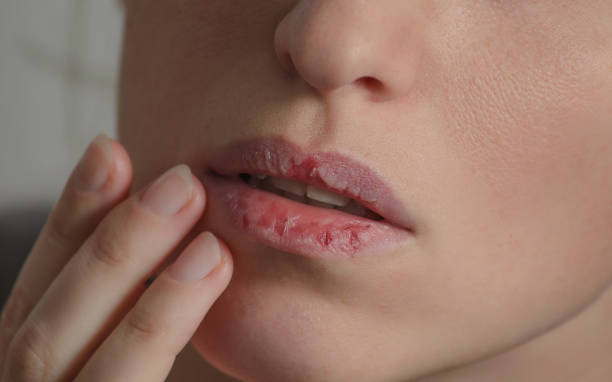Dehydrated Skin – Best Treatments For Your Dry Skin

Is it just me that experiences dehydrated skin in the winter?
No, it is not just you. Dehydrated skin is a burden that we all have to bear. As we gear up for the winter months and the weather begins to get colder, it is all too common to experience a shift in your skin’s texture. Most often, we notice our skin becoming drier and flakier beneath our scarves and beanies. Unfortunately, this change is not exclusive to people with regularly dry skin. Regardless of skin type, almost everyone experiences additional dryness during the winter. So, why does this happen? And is there anything that we can do about it?
Why does my skin get drier in the winter?
Let’s consider the science behind our dehydrated skin. Our facial skin serves as a barrier that protects us from the surrounding environment. The exterior of our epidermis traps in moisture, hydrating the skin. When we moisturize our faces, we strengthen this barrier of hydration. However, evaporation also occurs on the skin, especially when the weather is dry and cold. Similar to a wet sponge left outside, our facial pores will lose moisture more quickly in certain types of weather.
There are additional factors that may exacerbate water loss in the skin. Medicine and treatments designed to target acne typically involve a focus on the sebum (or oil) in the facial pores. If you are someone who uses any form of acne treatment, you may experience that your skin is more dry than usual. This will result in even greater dehydration during the winter months, so it is important to manually increase the amount of moisture on your face.
Further, there are some inherent traits that may increase skin dehydration. If you have a dry skin type, then you likely are already aware that the winter encourages your skin to flake and scale. We also tend to lose moisture in the skin as we age, so the older you are, the more you will notice a difference. Some people also find that those with more pigmented or darker skin are more prone to dryness. If you recognize that you are someone who experiences dryness frequently, the colder months of the year can be particularly frustrating. However, with an appropriate moisturizing routine it can be more bearable.
Can dehydration cause itchy skin?
Itchy skin is actually one of the most common signs of dehydrated skin. When the face skin is lacking in moisture, it tends to tighten up. This can cause itchiness and irritation that is quite unpleasant. This itchiness can occur not just on the face, but all over the body. Treating your skin with moisturizers should provide relief from the irritation. Internal hydration, like increasing your water intake, should also help.
Itchiness due to dehydration does not mean that anything is “wrong” with your body or health. However, conditions such as eczema and psoriasis as well as atopic dermatitis are often worsened by cold weather and subsequent dryness. Many people who deal with these skin issues experience flare-ups during the winter. If you are someone who has suffered from psoriasis and/or eczema in the past, you can unfortunately expect to see patches of dryness and irritation. These flare-ups may also look like rashes on the skin but can be treated easily. However, if you have dermatitis, psoriasis, eczema, or a similar condition, it’s a good idea to consult a dermatologist and see if there is a specific medication that they recommend.

How should I treat my dehydrated skin?
So, you’ve determined that you are experiencing dehydrated skin. Maybe it’s itchy, flaky, or just plain uncomfortable. What should you do about it? There are many ways to treat your dry skin, and they are best used in conjunction with one another.
To start, external dryness is absolutely related to dehydration on the inside of the body. When the weather becomes colder and drier, you should always make sure you are drinking enough water and keeping your body healthy. It might not feel like you need to hydrate as much when you aren’t sweating and losing liquids, but our bodies are very sensitive in the winter, and we need to take extra precautions to stay healthy.
Increasing your consumption of foods with high water content is also a good idea. This includes cucumbers, celery, and many other fruits and vegetables. Some people prefer supplements or vitamins for hydration but eating a balanced diet and drinking lots of water should provide your body with enough moisture.
Once we are ensuring that our bodies are receiving enough hydration on the inside, we can focus on moisturizing the outside. The most important step of a moisturizing skincare routine is making sure that you are using the right moisturizer. Even better, pick a nourishing face serum together with a good eye serum to add rich nutrients in addition to moisture.
There are many types of face creams and serums on the market, each with different properties and designed for different skin types. Look for clean skincare serums and always read the labels and look at the ingredients.
Everyday care of dehydrated skin
In addition to a moisturizer, every step of your skincare regimen can be designed to encourage hydration. When selecting a cleanser, it should be a product that will gently wash the face without stripping your pores of their natural moisture. Cleansing oil is a very good way to cleanse your skin without drying it out.
Harsh toners and makeup removers should be avoided in the winter, or all year if you are someone with naturally dry skin. Especially toners with alcohol or any other product with denatured alcohol. You should avoid these drying products at any cost. Additionally, the nighttime is a wonderful opportunity to provide your skin with extra nourishment. It is a good idea to switch to oil-based moisturizers to treat dry skin. Make sure these are unrefined, plant-based serums with a nourishing oily texture – these two serums are such a perfect option for day and night.

Is it okay to use my usual skincare products when my skin is dry?
If you are taking care of your skin and using items that have natural ingredients, you should absolutely be able to continue using these products. Plant Mother has serums that target imperfections without subjecting your face to any harsh chemicals that will dry it further. For example, Plant Mother’s Vitamin C serum is oil-based and carefully formulated to nourish the skin. Using a product with rich nourishing nutrients will help ensure that your face remains moisturized throughout the day.
If you are someone who uses harsher prescription treatments such as doctor prescribed retinol, you should be careful to switch to a non-drying option that will target anti-aging without weakening the barrier of your skin. Plant Mother’s wonderfully nourishing oil-based retinol serum is the best option for those who rely on retinol treatment but want a non-irritating alternative.
As long as you are selective about the products that you purchase, there is no reason for dry and dehydrated skin to prevent you from enjoying your typical winter skincare regimen.
Will my skin be this dry forever?
Suffering from dry skin is annoying and uncomfortable. Adjusting to colder weather is already hard enough without having to account for flaky and itchy skin. However, if there’s one thing we know, it’s that no skincare problem is untreatable. By following these specific tips and being selective with your product purchases, you can help to protect your moisture barrier. It might take some trial and error to find out what works best for you, but it is certainly worth it. With a little bit of effort, you can enjoy the cold weather with a lovely, moisturized face.
Medical Disclaimer:
This content is for informational and educational purposes only. It is not intended to provide medical advice or to take the place of such advice or treatment from a personal physician. All readers of this content are advised to consult their doctors or qualified health professionals regarding specific health questions. The publisher of this content does not take responsibility for possible health consequences of any person or persons reading or following the information in this educational content. All viewers of this content, especially those taking prescription or over-the-counter medications, should consult their physicians before beginning any nutrition, supplement, skincare product, or lifestyle program.
